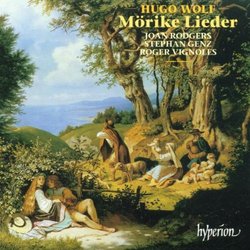| All Artists: Joan Rodgers, Stephan Genz, Roger Vignoles Title: Wolf: Morike Lieder Members Wishing: 1 Total Copies: 0 Label: Hyperion UK Release Date: 11/13/2001 Album Type: Import Genres: Pop, Classical Styles: Vocal Pop, Opera & Classical Vocal, Historical Periods, Modern, 20th, & 21st Century Number of Discs: 2 SwapaCD Credits: 2 UPC: 034571173115 |
Search - Joan Rodgers, Stephan Genz, Roger Vignoles :: Wolf: Morike Lieder
CD Details |
CD ReviewsFresh voices, Wonderful piano Sen Peng Eu | Kaohsiung, Taiwan | 05/02/2002 (5 out of 5 stars) "These 2 discs contains all Moerike Lieder of Hugo Wolf, sung in the publish order. Two singers are at their best, especially Stephan Genz, a really good young voice. The piano part is excellent. The booklet was designed in the classic Hyperion-lied style (thanks to Graham Johnson), beautiful, elegant and informative. All notes in the booklet were written by Vignoles himself, with somewhat stressing on the technic part. The object historical background or subject intrepretation note of each lied was often missing, compared to the notes of Johnson on Schubert." Who's Afraid of Hugo Wolf?--An Ideal Introduction to His (De Dace Gisclard | Houston, TX | 02/02/2009 (5 out of 5 stars) "This valuable set is, to my knowledge, the first and only complete recording of Wolf's first great song collection--all settings of poems by Eduard Morike. For those taking their first plunge into the works of this great song composer, this collection is, for several reasons, an ideal introduction to his varied and quirky world of vivid word-setting:
First, about 20 of these songs are among the composer's most familiar, often heard in recital and often assigned to university students. Second, the range of subjects and musical expression is tremendously wide. If pressed to describe Wolf's style for those unfamiliar with him, I would say "mini-Wagner." Of course, I realize that's a GROSS oversimplification, so don't write in! The sacred songs range from tender contemplations of the infant Jesus to breast-beating prayers of penitence and agonized self-examination. In the space of a review, one can only hint at the variety of the more numerous secular songs--love, both requited and "un" (An die Geliebte; Lebewohl), joy in bodily health (the hiker in "Fussreise"), elves and fairies (Elfenlied; Nixe Binsefuss), neurosis (Verborgenheit), the beauty of nature (the Maxfield Parish sunset of "Auf einer Wanderung"), sex(daringly explicit for the time), wacky humor ("Zur Warnung", in which the poet describes his fruitless attempts at writing coherent verse after waking up with a hangover! ) and MUCH more. "Der Tambour" is a comic masterpiece--a young soldier wishes his mother were a witch, and could magically supply him with beer and sausages. The references to a "serpent" in "Erstes Liebeslied eines Madchens" leave little to the listener's imagination--this is as close as 19th century lieder gets to literal descriptions of sex! "Abschied" ends the collection with the composer literally kicking his critics downstairs. Throughout the collection, Wolf reflects the poet's daring verses with music of equal audacity and variety. The performers give little, if any, cause for complaint. Joan Rodgers and Stephan Genz are in top vocal and expressive form throughout, pointing up the meaning of the texts without affectation. Pianist Roger Vignoles mirrors their every nuance. In the strenuous piano postlude to "Er ists," some, like me, may feel that the pianist's unmarked slowing down 14 measures before the end passes over from "expressiveness" into the realm of the technically self-serving, but this was my only objection. True, I won't be getting rid of my copy of Fisher-Dieskau's Morike selection with Gerald Moore on EMI--many of those performances are inimitable, and in 1958, Dieskau was in HIS freshest voice. Of course, even Dieskau couldn't reasonably record the songs that are obviously for a female protagonist, although, oddly, he DID record Gesang Weylas! The use of TWO singers in the present set allows the songs to be logically divided along lines of gender. This usually works out well. At first, I found it odd hearing "Nimmersatte Liebe" (a bitter indictment of 19th-century sexual roles) coming from a woman's lips, but Rodgers turns it into a woman's protest--a fresh and valid take. However, the massive climax of "Verborgenheit" requires more vocal heft than she can summon. On the plus side, Nos.3, 7, 14, 16, 41, 42 and 45 are all best sung by a female voice and Dieskau didn't record any of them for either EMI or DGG. This is not repertoire that offers fast and easy thrills--not just something to pop on the CD deck for background music. Getting the juice out of this music requires conscious listening. This is for poetry lovers who enjoy savoring a good book. Take your time, read the excellent and extensive notes by Roger Vignoles, follow the songs with the translations provided, pay just as much attention to the piano part as to the vocal line, and don't try to take the whole set in at once. Your patience will be rewarded as each of Morike's pictures spring to vivid life under the illumination of Wolf's music and the insights of these superb performers." |

